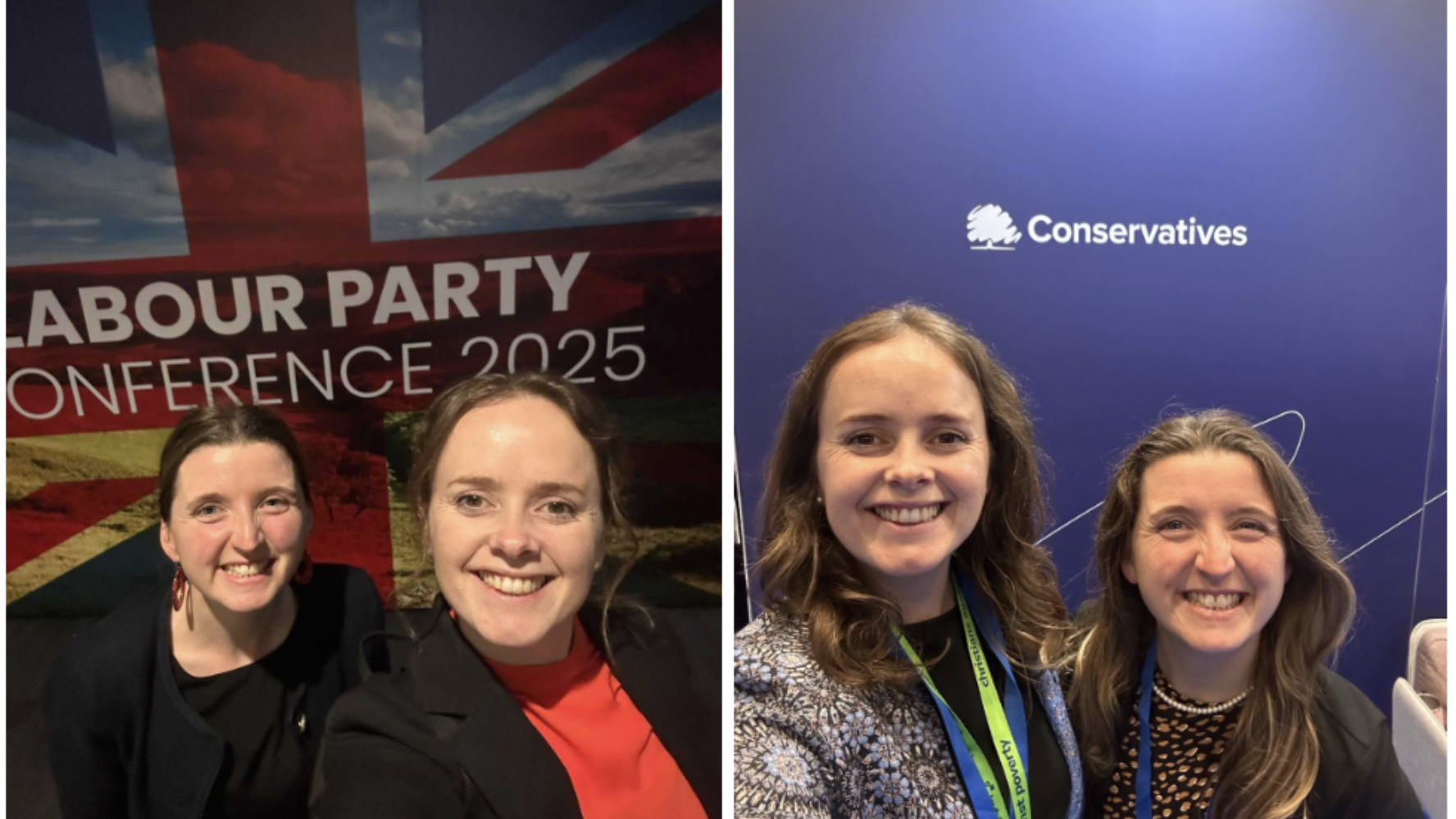
Juliette Flach, CAP’s Policy and Public Affairs Manager, provides a behind-the-scenes glimpse into the world of Party Conferences and why Christians Against Poverty engages in this space.

Every year, as the leaves start to turn golden brown, I pack up my official passes and head to multiple party conferences. It is a bizarre part of the role of Policy and Public Affairs Manager where I spend five days one week surrounded by enthusiastic Labour Party Members in Liverpool, and the next in amongst staunch Conservative Party Members in Manchester. On returning, my friends often ask me the same two questions: ‘Why do you go?’ and ‘What’s it actually like?’; so I will answer these two and one of my own: ‘What next?’.
Why do you go?
As a charity, CAP speaks into political spaces, but in a non-partisan way. We do not align with any particular political group, but instead aim to outwork the values of being collaborative, compassionate, determined and expert when engaging with parliamentarians and decision makers. As a result, the party conference time is an important time in the annual calendar for us to collect intel to inform our policy suggestions and develop our public affairs work.
We hear what the parties are planning, what position MPs in the different parties are taking, and what policies are being discussed versus which are being discarded. It is not an exact science; with thousands of attendees, there will be differences of opinion even within the party, but it helps us to get an impression of the tone of the rooms we are in. Having an understanding of political positioning enables us to develop our bank of policy asks, to continue pushing for policy changes that help in the steps towards an end to UK poverty.
Ahead of this year’s Party Conferences, we created the briefing ‘Drivers of Poverty’ for MPs on what policy changes are needed to address the drivers of poverty. This is one of the many resources we create for MPs (which you are always welcome to share with your parliamentarian: capuk.org/mp). Through the deeper understanding of the current political discourse, we will continue to work with politicians from across the political spectrum to action these.
Alongside helping to inform our policy work, the conferences are also a time when we build relationships with MPs and their staffers. We are fortunate to have positive working connections with politicians from different parties. On a local level, many of our team of around 3,000 local CAP workers have great connections with their MP. Within constituencies across the UK, MPs often visit CAP centres, referring constituents who are struggling to CAP services, and praising the work CAP is doing in their community. We also engage with MPs on a national level, speaking to them in their role as key players to hold the government to account and bring about policy change that can make meaningful differences.
But it is important to note that this is not just a once-a-year engagement. Developing our policy positions and building relationships with MPs occurs all year round. And as discussed in my last blog ‘Sharing realities with the Minister for Social Security and Disability’ this is always rooted in our clients’ experiences and the insights we have from research we conduct.
Read our latest research, ‘Picture of poverty’
Read nowWhat’s it actually like?
In short, it’s a whirlwind! Every day will be different, but it tends to consist of attending back-to-back fringe events on a range of topics linked to poverty. And unfortunately, the concept of resting on a Sunday has not been embraced across the Party Conference timetables, so to give you a glimpse, this was my Labour Party Conference timetable on Sunday:
8:30–10am Christians on the Left Church Service
10–11am Speak to MPs and Parliamentary assistants
11am-12pm ‘Making Work Pay for the Self-Employed’ — then jumping out early to attend the next session!
11.30am-12:30pm ‘What does the Labour Government need to do to give every child the best start in life’
1–2pm ‘Access for all: Tackling Financial Exclusion in the UK’
3:15–4:15pm ‘The Rising Cost of Growing Old: how to support pensioners in poverty’
5:45–6:45pm ‘Financial Growth: Boosting living standards through financial inclusion’
7–8pm ‘Stigma in the social security system’
8–11pm ‘Essentials Guarantee’ — speeches and networking
The eagle-eyed will spot there are a few gaps in the schedule, but these get filled with speaking to MPs, building connections with other representatives from organisations working in the anti-poverty sector, walking between the event locations in and out of the secure zone, and grabbing food as we go. So the conference season consists of a lot of information, conversations, and steps!
What next?
I think there is a fair critique that the Party Conferences risk perpetuating echo-chambers. In essence, they are spaces where members of a political party will come together and often passionately agree with their shared perspective. So seen in isolation, the conferences alone are not the spaces where the whole world’s problems get sorted. But if seen in the context of the whole year, they are an opportunity for us to sense-check and build connections.
The main value in my eyes comes from what comes next: following up on conversations we have at conferences. Now we’re back from conferences, it’s time for us to facilitate the centre visits, set up the follow-up meetings in Westminster, build on collaborative ideas, and continue to work to bring about policy change.
Time to make a cuppa and get cracking!




